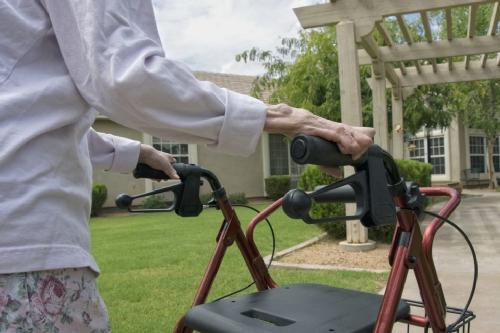
Convincing Your Parent to Move to Assisted Living
Conventional wisdom says that we all want to stay in our homes for as long as possible. That is how most of our elders feel, but it's not always in their best interest to do so. How do we talk with them about the realities and dangers of staying at home once their health is failing? How do we convince them that a move to an assisted living community could be a mentally and physically beneficial option?
Is Aging in Place a Safe Option for Seniors?
Part of the problem with convincing elders, and many younger people for that matter, is that most haven't been inside a modern assisted living facility. Deep inside, they harbor the outdated images of an "old folks" rest home, with cement block walls and the smell of stale urine. They consider moving from the family home as one more step away from independence and closer to death. This image and mindset are stubborn and inaccurate for most seniors.
Professional in-home care and a personal alarm are sufficient for some seniors to remain safely at home. But if they are alone or their spouse is frail, there's no one to help them in case they fall and can't set off their alarm. There are few opportunities to socialize. Meals become a chore, so some seniors stop eating. Their memory may be failing, so the stove doesn't get turned off. An elder who stubbornly clings to the idea that their familiar home is the best for them is often a sad and lonely sight.
Seniors Thrive in Assisted Living
Contrast this life with living in a reputable assisted living center, whether it's a stand-alone facility, one connected to a nursing home, or a small family operation where only a few seniors reside. In any of these situations, seniors can thrive for several reasons. They are not responsible for maintaining a home, so they are relieved of the pressure to hire help, tackle household projects themselves, or let the house deteriorate. Assisted Living communities have trained staff available 24/7 in case residents need medical help or other assistance. Fully prepared nutritious food and snacks are available. Perhaps, more importantly, seniors can make new friends and have an abundance of engaging activities to choose from.
So…you know that you can't keep providing the constant oversight that has been taking over your life and, by extension, the lives of your spouse and children. You are convinced that mom and/or dad need to make a move. But, how do you go about convincing them that it's time to think about a move to assisted living?
Convincing a Parent to Consider Assisted Living
- First, plant the seed. Don't approach your loved one(s) as though you've already made the decision for them. Simply mention that there are other options out there that could make life easier and more fun for them.
- Next, research nearby assisted living communities and offer to take them on some tours. If he or she is willing, great! But don't push it. Drop the subject if they resist, and wait for another day to tackle this next step.
- Wait for a "teachable moment" to present itself. Did mom fall, but manage to avoid getting badly hurt? Use that as a springboard. You may want to wait a bit or immediately say something like, "Wow, that was a close call, and I'm sure it was a very scary experience for you. Once you're feeling better, maybe we could go look at the new assisted living center over by the church. We'd both feel better if you had people around." Go with your gut on the timing, but use this unfortunate event as an opportunity to give your loved one a gentle reality check.
- Unless you consider your loved one's need for placement in assisted living an emergency, don't push. It's hard to wait, but you will likely need to. Wait for a very lonely day when mom is complaining about how she never sees her friends anymore. Then gently try again. Do your best to make them feel they are in control of their life and this decision.
- Ask around to see if anyone you know has a loved one who is already made the move. It's even better if you find that one of your loved one's friends has already made the move. Just like your first day of school when you looked for a friend, any friend who may be in your class, your parent would feel much better if there was a familiar face already in the senior living community.
- Even if they don't know anyone in a specific facility, you can still take your parent to enjoy a meal or participate in an activity, such as playing cards or Wii bowling. Show off the social aspects of a good community. Keep it light, and don't force the issue. Tour more than one community, and ask your parent for their input if possible.
- On tours, show interest in how much privacy residents have. Ask about bringing furniture from home and how much space there is in each room. Take a measuring tape and visualize how your loved one's apartment could be set up and decorated. Demonstrate the same level of excitement as you would if you were helping your parent move to a new apartment because that is exactly what you are doing.
- Stress the benefits and peace of mind that increased safety measures will offer both of you.
- Highlight that assisted living allows seniors to forgo daily chores and hassles so they can focus on things they want to do. There's no yard work, but gardening activities are offered. Meals are available in the dining room or restaurant, but many apartments feature a full kitchen, so seniors can cook if they wish. There's plenty of freedom to be alone and plenty of opportunity for the company when they desire it. You know your loved one best, so stress the aspects that you know they'll enjoy.
The last step in this process is to wait and let it all sink in. Unfortunately, many caregivers have to wait for another fall or other health scare to occur before their elders will be willing to make the decision themselves.
If your family is close-knit, arrange a meeting and tell mom or dad how much better everyone would feel if the move were made. Don't make it seem like an intervention or a done deal that they have no say in. Allow everyone involved to discuss their concerns and anxieties about the current situation and a potential move. Third parties often make headway when the family fails.
Making The Move to Assisted Living
Be sensitive to your parent's feelings. Leaving a home full of memories is a very difficult and emotional decision. Whittling down a lifetime of possessions is a lot to ask of someone. Be kind, be sensitive, and try to make it about your parent and not you.
It is worth noting that loved ones with memory loss may not be fully aware of their limitations and remain adamant about staying at home. Unfortunately, for their families, no amount of rational thinking or negotiation will get the elder to change their minds. Power of attorney or guardianship proceedings and some white lies may necessary to get a loved one to move to a new setting where their safety and wellbeing are guaranteed.

Related Articles

Assessing Your Loved One’s Ability to Complete Activities of Daily Living

Holiday Gifts for Loved Ones in Senior Living

Are You Putting Off a Move to Assisted Living?

Worried About a Move to Senior Living? Don’t Be!

Sibling Rivalry: Why Can't We Agree on Our Elderly Parents' Care Needs?

Understanding Why Your Loved One is Refusing Senior Living

Power of Attorney for Your Elderly Loved One – A Basic Guide

